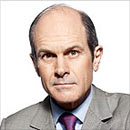We're having the wrong debate about rising health care costs
April 25, 2012: 5:00 AM ETIf we made just a few lifestyle changes, Americans could drastically reduce how much we spend on health care. So why don't we?
By Geoff Colvin, senior editor-at-large
 FORTUNE -- The central mystery in America's health care crisis is a simple question: Why don't people take better care of themselves? Like many simple questions, it leads into deep waters. It demands that we confront a profound new reality about health. Most important, it requires us to reframe the debate over paying for health care.
FORTUNE -- The central mystery in America's health care crisis is a simple question: Why don't people take better care of themselves? Like many simple questions, it leads into deep waters. It demands that we confront a profound new reality about health. Most important, it requires us to reframe the debate over paying for health care.
That debate will rage when the Supreme Court issues its ruling on Obamacare in June. But that case isn't really about health care; it's about the limits of federal power. Regardless of the ruling, we'll still have to stop America's unsustainable health care cost trends. And most of the debating will be over the wrong question.
Our thinking on health care policy is premised largely on a reality that prevailed for nearly all of human history: that ill health is a curse that can be visited upon any of us at any time. It is that, of course. But that notion is no longer the right premise for thinking about health care costs in developed economies. At the beginning of the 20th century, the top causes of death in the U.S. were communicable diseases -- flu, tuberculosis, curses that could strike any of us. Today the top causes of death are noncommunicable diseases that result mostly from the way we live -- coronary artery disease, hypertension, diabetes, some cancers. Medical researchers call them lifestyle diseases.
What's important from a policy perspective is not just that these diseases cause the most deaths, but also that they cause the most spending. The great majority of America's staggering $2.6 trillion health care tab (as of 2010) was spent treating lifestyle diseases. While we rightly worry about health care costs rising 8% or 9% a year, we spend well over 50% of our costs on diseases caused mostly by the way we choose to behave.
More: 5 ways to healthier employees
If Americans behaved just a little differently, our health care costs could settle down to a sustainable growth rate that matches the economy's growth, or could even fall further. We don't need a nation of triathletes. If we would smoke and drink a little less, walk a little more, eat a few more vegetables and fruits, and lose some weight, the effect would be far more dramatic than most people suspect. "More than 90% of type 2 diabetes, 80% of coronary artery disease, 70% of stroke, and 70% of colon cancer are potentially preventable" by that combination of moderate behavior changes, reports Harvard epidemiologist Walter C. Willett. In other words, by making realistic changes that are entirely within our own control, we could end the crisis of unsustainably rising U.S. health care costs. Which brings us to that simple question: Why don't we?
The answer isn't so simple. Partly it's economic -- we bear ever less of the costs of our unhealthy behavior. In 1960 we paid 56% of our personal health costs out of our own pockets; in 2010 we paid 14%. Yet that can't be the whole explanation; we know from the findings of behavioral finance that we aren't purely economic beings.
Social acceptability plays a role. "I got pilloried in the New York Times three years ago when I talked about not hiring obese people," says Dr. Delos Cosgrove, CEO of the Cleveland Clinic. "Now it's okay to talk about it." For legal reasons he can't refuse to hire the obese, but if he could, it would send a message: Being obese isn't okay.
The most distressing answer to the question is that many of our bad behaviors are addictive. Smoking is highly addictive. Alcohol is addictive for many people. Some researchers now go much further, suggesting that today's processed, calorie-dense foods -- "hyperpalatable," the researchers call them -- may be addictive for some people. Researchers at Yale, using functional MRI scans, find that some people's brains respond to a chocolate milkshake like drug addicts' brains respond to drugs.
What's the best policy response to those facts? Unfortunately, instead of talking about it, we're focused on how to apportion our rising health care costs. That's a tragic missed opportunity. We need to reframe the debate: not how to share health care's economic burden, but how to seize the enormous opportunity to reduce it.
This story is from the April 30, 2012 issue of Fortune.






Join the Conversation (20 of 43 comments)
Login below to leave a comment
Glad you liked it. Would you like to share?